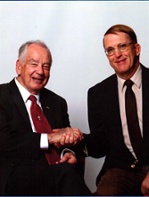The crowd waited in rapt anticipation. The famous motivational speaker was about to take the stage. He was going to motivate them to do more, be better, and whatever else they desired. I was in that audience and I too was anticipating the speaker’s words, although for a different reason.
I’ve studied motivation for years and I firmly believe we cannot motivate other people. But I wondered a little. After all, this famous person was extremely successful as a motivational speaker. What did he do that I did not understand?
The speaker that day was Zig Zigler. He told stories. He made important points. He was encouraging. He was fascinating. But he wasn’t motivating.
I know some will consider that a sacrilege. Please read on.
As I listened to Zig speak I began to understand his success. After the speech I was privileged to attend a small private lunch with him. As we asked questions, it became clear. Zig Zigler didn’t really motivate anyone. He had a gift much more valuable than that.
What Zig did was help people understand their own motivation, then help them find ways to achieve it.
That’s what effective leaders must do. Many times leaders are successful in changing behaviors and they think they’ve successfully motivated their workers. They haven’t. That’s because real motivation is a force that exists within each of us. Those internal motivations are what drive us. They’re what cause us to be frustrated when they aren’t met.
So, to be successful, a leader must stop trying to motivate and instead strive to provide an environment that allows their workers to achieve their own motivations.
That means getting to know your people. I was working with a small business owner who complained that his workers didn’t really seem to be engaged in the business. His business made jewelry and the two people he was talking about were true artisans. I asked what he knew about them. He gave me the standard answers about age and family. He remembered that one of them had a motorcycle. When I asked him why these two worked there and what their goals in life were, he couldn’t answer. The problem was, he built his business on his own artistic talent and he would never let his other craftsmen have any creative input. It was not a motivational climate and these talented workers had become disengaged.
If you want workers who are motivated and engaged, get to know them. Then, find ways to help them achieve what motivates them.
Remember one of Zig Zigler’s best known sayings. “You can have everything in life you want, if you will just help enough other people get what they want.”
